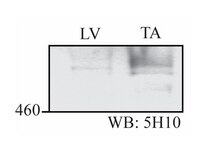MABT126 Sigma-AldrichAnti-Obscurin Antibody, clone 5H10A
This mouse monoclonal Anti-Obscurin, clone 5H10A Antibody, Cat. No. MABT126 is tested in Immunofluorescence Immunohistochemistry, and Western Blotting for the detection of obscurin.
More>> This mouse monoclonal Anti-Obscurin, clone 5H10A Antibody, Cat. No. MABT126 is tested in Immunofluorescence Immunohistochemistry, and Western Blotting for the detection of obscurin. Less<<Recommended Products
Přehled
| Replacement Information |
|---|
Tabulka spec. kláve
| Species Reactivity | Key Applications | Host | Format | Antibody Type |
|---|---|---|---|---|
| H, M, R | WB, IHC, IF | M | Purified | Monoclonal Antibody |
| References |
|---|
| Product Information | |
|---|---|
| Format | Purified |
| Presentation | Purified mouse monoclonal antibody IgG1 in buffer containing 0.1 M Tris-Glycine (pH 7.4), 150 mM NaCl with 0.05% sodium azide. |
| Quality Level | MQ100 |
| Physicochemical Information |
|---|
| Dimensions |
|---|
| Materials Information |
|---|
| Toxicological Information |
|---|
| Safety Information according to GHS |
|---|
| Safety Information |
|---|
| Storage and Shipping Information | |
|---|---|
| Storage Conditions | Stable for 1 year at 2-8°C from date of receipt. |
| Packaging Information | |
|---|---|
| Material Size | 200 µL |
| Transport Information |
|---|
| Supplemental Information |
|---|
| Specifications |
|---|
| Global Trade Item Number | |
|---|---|
| Katalogové číslo | GTIN |
| MABT126 | 04054839193552 |
Documentation
Anti-Obscurin Antibody, clone 5H10A MSDS
| Title |
|---|
Anti-Obscurin Antibody, clone 5H10A Certificates of Analysis
| Title | Lot Number |
|---|---|
| Anti-Obscurin, clone 5H10A - 3393296 | 3393296 |
| Anti-Obscurin, clone 5H10A - 4027367 | 4027367 |
| Anti-Obscurin, clone 5H10A - 4175187 | 4175187 |
| Anti-Obscurin, clone 5H10A Monoclonal Antibody | Q2835679 |








